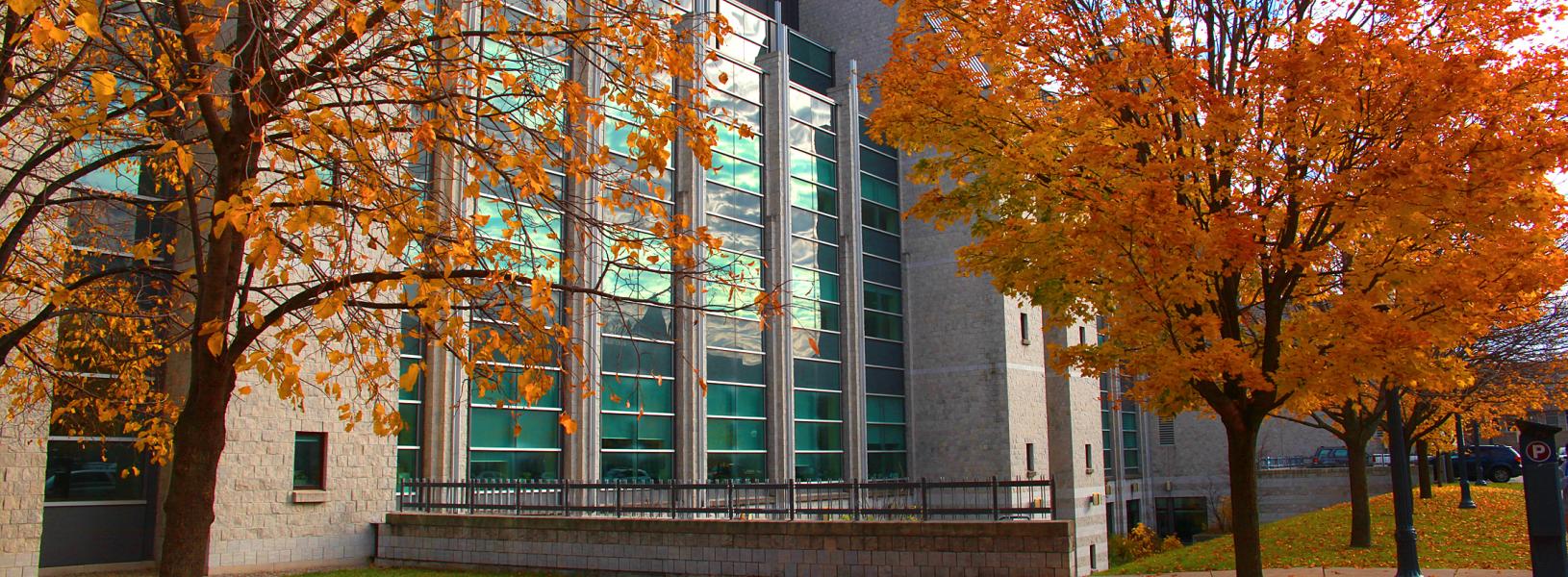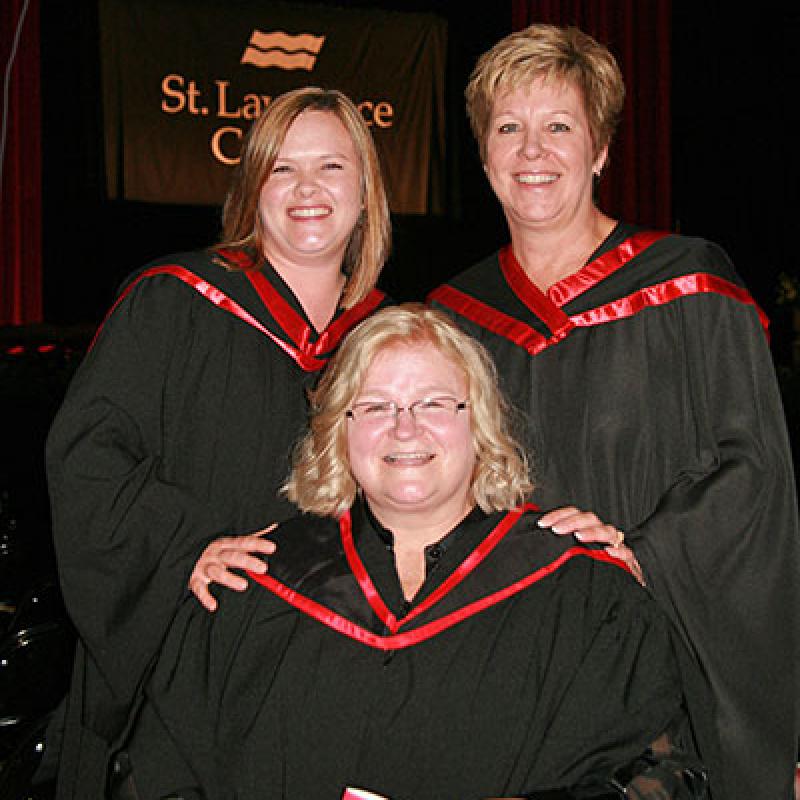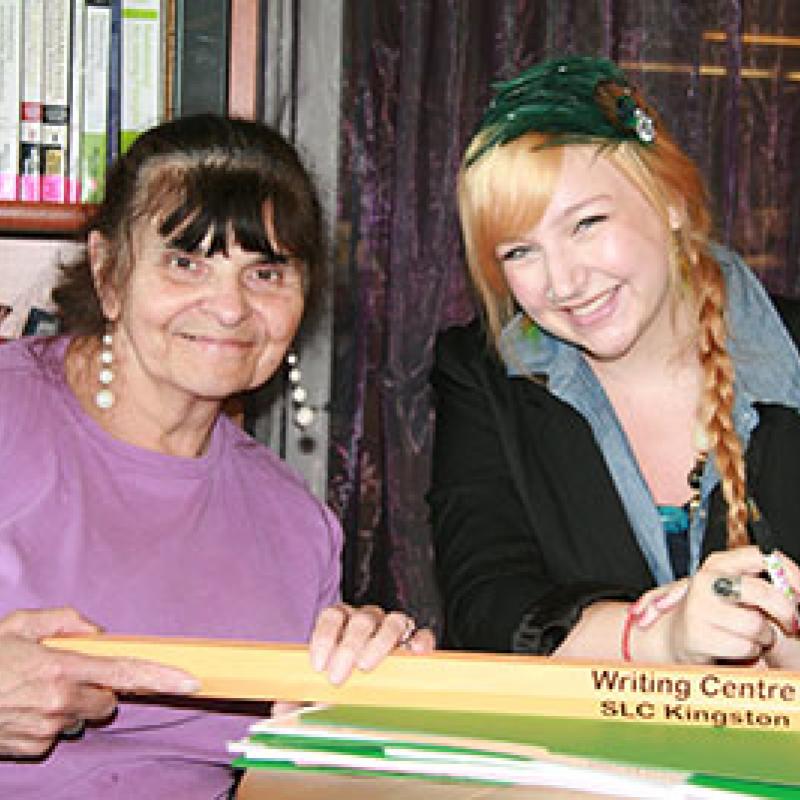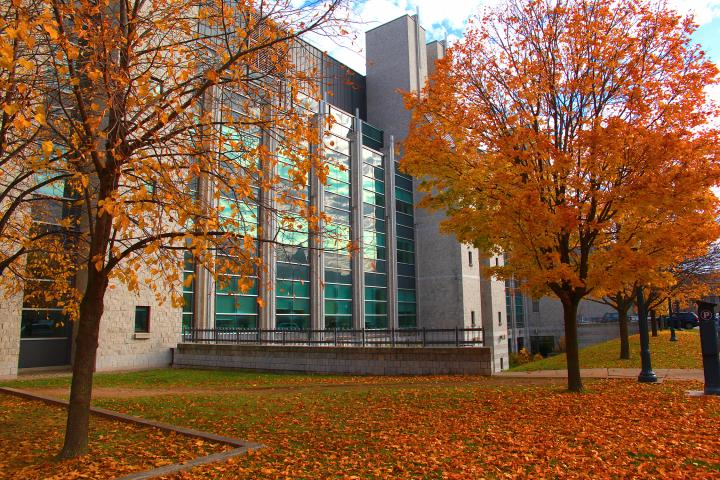Graduation is always an exciting time for students. After three, four, or more years in university, there’s a sense of elation as that final term comes to an end and they’ve earned a degree. But what comes next? For more and more grads, the answer is just down the road: community college.
“College is the new grad school,” says Shannon Hope Gendron, Artsci’10.
Gendron completed a degree in Gender Studies and History with a certificate in Gender and Sexual Diversity. She’s now entering her second year of studies in the Behavioural Science Technology (BST) diploma program at St. Lawrence College in Kingston, where she also serves as a tutor in the College’s Math and Writing Centre.
“My family was relieved when I told them I was going to college instead of grad school, she says. “They all know I’m a massive nerd. They knew I was going to stay in school, and they worried about my student debts.” But, she says, the potential paycheque at the end of the diploma “calmed their hearts.”
“They used to ask me what I was going to do with a degree in Gender Studies and what I was going ‘to be.’ Now I can tell them that I’m going to be a behaviour therapist. It’s a more marketable title than ‘feminist,’ and one they understand,” she adds, laughing as she recalls trying to explain to her Queen’s degree to her grandmother.
The paycheque isn’t the only reason Gendron is attending college. She wanted to be a teacher from the time she was two years old. She was about to hit “send” on her application to teacher’s college when she changed her mind and applied to college instead.
“My Queen’s degree was about my passion,” she says. “It was about philosophy, politics, and shaping my self-identity. I learned critical thinking and un-learned some of my pre-conceived notions of myself and society. I became aware globally and personally.”
In contrast to her degree, Gendron’s college diploma is all about logic. “Perhaps it’s the change from a political program to a science-based one,” she says, “But BST is still about teaching and still about helping the marginalized.” She sees it as being the ideal combination of her lifelong dreams, the political convictions she developed at Queen’s, and her deep sense of community.
Gendron is far from alone in her decision to study at a college after completing a degree. It’s a trend that has steadily been increasing. In 2002, just six students who applied to St. Lawrence College declared on their application forms that they had previously completed a degree. By 2008, that number had risen to 80, and by 2011, there were 140. These figures don’t represent the full complement of students who are also university grads; most programs don’t require applicants to list university credentials, so many, including Gendron, don’t provide the information. However, the trend is clear. It also matches the trend across Ontario.
According to the Ontario College Application System (OCAS), three per cent of applicants to Ontario’s 24 colleges listed having a degree in in 2006. By 2010, the most recent date for which numbers are available, that percentage had nearly doubled. There are indications that the registrars at the 126 colleges in the other provinces of Canada are seeing a similar trend. So what is driving this change?
Lorraine Carter, Artsci’81, MA’83, the Senior Vice-President, Academic, at St. Lawrence College says there are many reasons. One is the changing nature of the work force. “There was a time when the job market allowed you to be hired without a specific skill set,” she says, noting her own experience of graduating with her MA and entering the corrections field.
“If there were specific skills you needed, the organization would train you. Now, the ideal is to have both university and college training. I think there’s so much participation in post-secondary education now that employers can afford to be picky.”
Colleges provide those job-specific skills sets because that’s why they were set up in the first place. Field placements and practical applications of skills are part of most programs – for example, many programs have as many as 10 weeks of placement in an eight-month academic year – and advisory boards keep colleges up to date on what’s needed in the sectors they serve.
“I hear students coming out of university saying ‘I have lots of theory, but no practical experience’,” says Terri McDade, Artsci’86, Dean, Faculty of Arts at St. Lawrence College and a grad of the College’s Child and Youth Worker program. “While university provides depth and breadth, college provides skills for front-line positions. College grads are instantly employable,” she says.
This is not to say that anyone at college considers university to be a waste of time. “At the end of the day, people need jobs. They need to eat. Colleges provide the connections and applied experience to help them do that,” says Carter. “But our culture also values the things university provides” she says. She mentions critical thinking skills, organizational skills, and even just the time it takes to grow up. (“Who knows what they want to be at 18?” she says.) “The skills that are learned university will certainly inform and affect the job that someone does.”
Meaghan (Libbey) Shaver, Artsci’97, knows this very well. Shaver finished a degree in Psychology, came to St. Lawrence for the BST program, and now co-ordinates the College’s Autism and Behavioural Science program, which requires applicants have either a degree or diploma. Says Shaver, “My degree taught me how to learn and how to research, but I had no idea how to translate that into a job. I knew I didn’t want to work behind a desk my whole life: I wanted to work with people and make a difference in their lives.”
She notes that one of her mentors, Prof. Emeritus Peter Platenius (Psychology) recommended that she consider St. Lawrence’s BST program. So, after a few years working in non-related fields, she followed his advice. “I felt so excited and ready for the job market after finishing my diploma,” she says, adding that having a degree as well as a diploma offered her many opportunities for advancement.
She sees the difference in her own students, too. About half come from college, half from university. “The college students are used to giving presentations, sharing experiences in class, role playing, and they have an intimate knowledge of children’s development. On the other hand, university grads are very analytical, research focused, and are good at self-teaching. Both are excellent backgrounds and are equally valuable in an evidence-based field such as Behavioural Science, but they are different,” she says.
Carter, McDade, and Shaver all agree that one of the biggest changes driving more people toward college is the changing perception of education.
“When I went through high school as an academically inclined student, college was never even mentioned to me,” says Carter, a sentiment echoed by Shaver. “It’s not surprising,” says Carter. “By definition, teachers are academically inclined and have gone through university in order to be qualified to teach. It’s a structural bias.”
Carter explains that education used to be seen as a ladder: high school, college, bachelor degree, then grad school. At some point, you stepped off the ladder and went to work. Or if you were one of the very fortunate, you worked your way up until you could stay at university as a professor. Nowadays, education is seen more as a series of pathways. You can go to one then another, or to work, then back to school again, without a sense of stepping down or going backwards.
“Students need to be aware that all the paths exist, and that they shouldn’t pre-emptively cut one off” Carter says, adding that her own daughter, Emily Carter, Artsci’12 will be attending college in September after completing a three-year BA in art history.
McDade notes that like Emily Carter, more that half of all St. Lawrence students don’t come directly from high school. Some come from degree programs. Some come to upgrade their skills after having worked for a time. Some come to retrain after being laid off, and others come simply to switch careers.
Such fast-track programs as the biomedical engineering program at Durham College in Oshawa, the business, sales, and marketing program at Loyalist College in Belleville, software engineering gaming program at Centennial College in Scarborough, and the social service worker, early childhood education, police foundations, human resources, and child and youth worker programs that are available at many colleges, also help drive the trend toward college. So do degree programs such as St. Lawrence’s four-year Bachelor of Applied Arts in Behavioural Science.
In technology, exciting partnerships are opening up like the collaborations between Queen’s and St. Lawrence to research solar panels with the goal of optimizing them for winter conditions – as was reported in the June issue of Canadian Geographic. Colleges are also pursuing international opportunities and partnerships.
Yet, for all the international opportunities, McDade notes that the community is a very important part of why people to college. She notes, for example, that 80 per cent of St. Lawrence grads stay within 60 minutes of one of the College’s three campuses.
“International experiences help them understand how communities work, and how education can be a way out of poverty. It helps them find their place, and helps them understand how they can be conduits of change.” Then, she says, they return home and apply all those skills locally.
Some, like Shannon Gendron, fall in love with the city in which they attend university. Earning a career-oriented college diploma is one path that can help grads stay put, find gainful employment, give back to the community they’ve grown to love. It seems that more and more young grads are opting for that choice.
Sara Beck teaches communications at the Kingston campus of St. Lawrence College.
What's Next?
By Catherine Keates, Director, Career Services, and Christine Fader, Career Counselor
Graduating is a huge accomplishment and can be full of excitement…and sometimes, a certain amount of trepidation. If you’re a new graduate, here are some top tips from Queen’s Career Services designed to help you as you ponder the big question…”What’s next?”
-
Get focused – Some graduates say they’ll work “anywhere” at “anything”. While being flexible is helpful, being too vague might actually make your job search more challenging. The reality is that you are possibly driven at least somewhat by location and/or by some ideas about what you would like to do.
-
Develop a set of keywords (e.g. Saskatoon, historical medicine, coordination and leadership) that you can use when speaking with people, searching online and networking. Even if you don’t have a very specific job in mind, mention whatever specifics you can to help other people think about potential employers and resources they could connect you with. Anything’s better than the neutral statement, “I’m looking for a job.”
-
Get good at articulating skills you gained from your degree. Many university graduates are somewhat vague, even mystified, about the tangible skills gained from their degree(s). Get clear on your areas of knowledge, skill and interests so that you are ready to communicate these assets in conversations with prospective contacts and employers. Don’t have the words to express what your degree-related skills are? Check your old course calendars. What did they say you would learn/know by the end of your courses and program? Pump up the key words.
-
Be optimistic – Recent graduates are often new in their chosen field and sometimes that can feel as if finding opportunities is a steep hill to climb. Regardless of what the economy is doing, job opportunities continue to exist due to worker career change, illness, maternity leaves, retirements, project work and more. All work is REAL work, whether it’s temporary, contract, internship, volunteer or “permanent”. Staying optimistic can be challenging sometimes when you’re deep in the trenches of job search but it can be a key factor in helping you stay positively connected with people and prospective opportunities.
-
Revisit your resumé – Graduation is a good time to check whether your existing resumé needs a major overhaul. Check that you’ve maximized the information about your degree, especially if your degree is a major part of your related skills for the work you’re aiming for. This means highlighting relevant courses, marks (if 80 per cent, plus), projects, a thesis, major essays or assignments, field work, clinical placements, etc. It also might mean re-grouping your experiences so that the ones related to your current goals are located higher up in your document.
-
Network – The overwhelming majority of work is found not through job postings but through “who you know.” You don’t have to know lots of “fancy” people to effectively network and find opportunities. The popularity of professional social networking sites such as LinkedIn can be immensely helpful for this. Join groups where you’ll meet like-minded professionals. Reading their profiles will help you get information about typical roles and organizations around your interests. You can also investigate Queen’s Alumni Branches around the world (alumni.queensu.ca/) to connect with fellow grads in geographic locations in which you’re searching for work. While not professional “job search coaches,” Queen’s people are often happy to share their own career journeys, insights, and networking contacts to help and support new graduates.
Congratulations to all new grads on this huge accomplishment! Whether you're feeling excitement or trepidation (or a little of both), we hope that these tips will help you as you make your way into your life as a Queen's graduate.



